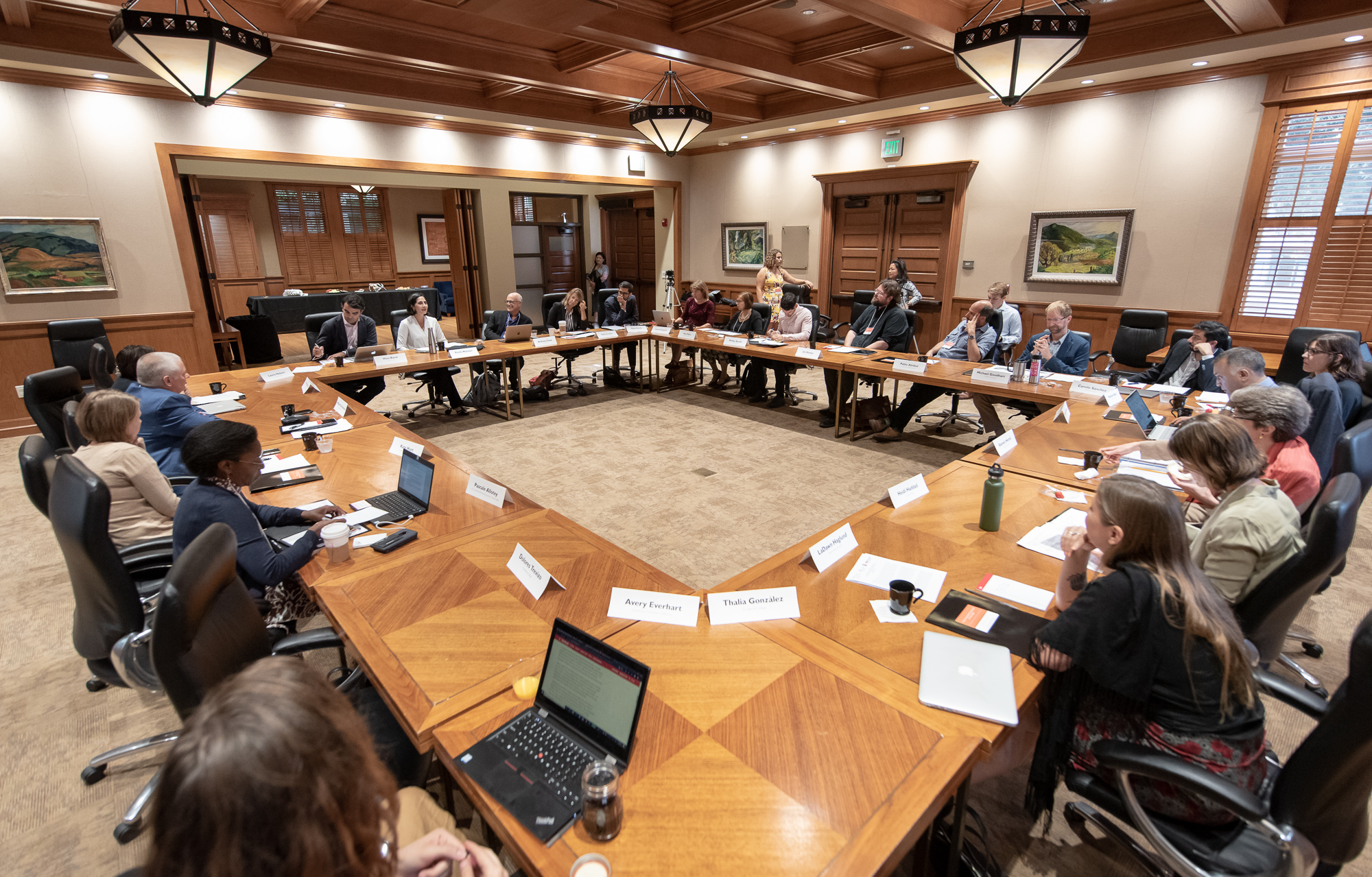Crosscutting approaches to human rights

Pardis Mahdavi, dean of social sciences in The College of Liberal Arts and Sciences, at the “Crosscutting Global Conversations on Human Rights: Interdisciplinarity, Intersectionality and Indivisibility" workshop in 2019. Photo courtesy of Occidental College/Young Initiative on the Global Political Economy.
Last year, Arizona State University's Pardis Mahdavi and LaDawn Haglund joined scholars and thought leaders from around the world with a simple but difficult challenge: How can human rights policies evolve to better serve the most vulnerable populations? Since the workshop concluded, attendees have continued to work together to address this question through informative articles.
The ongoing partnership among The College of Liberal Arts and Sciences, Occidental College’s Young Initiative on the Global Political Economy, the University of Southern California’s Institute on Inequalities in Global Health, Indiana University and Open Global Rights began at “Crosscutting Global Conversations on Human Rights: Interdisciplinarity, Intersectionality and Indivisibility,” a two-day workshop that took place at Occidental College in Los Angeles. Attendees from a range of disciplines discussed and grappled with global human rights crises relating to four main topics — sexuality, gender, localism and cosmopolitanism. Through these conversations, they envisioned creative ways to address challenges.
Building on momentum gained at the workshop, the group has continued asking questions about human rights issues and has shared thoughtful analysis through a number of articles in an effort to inform and engage policymakers and the general public. The articles are published on Open Global Rights, a website where legal advocates, on-the-ground activists and scholars contribute to dialogue and share ideas and personal experiences in relation to the current state of human rights.
Mahdavi, dean of social sciences in The College, said the goal of the partnership’s ongoing efforts is to make human rights policy more interdisciplinary while aligning policy with lived experiences to better serve the most vulnerable populations.
“I think that human rights sits right at the nexus of some of our most challenging and pressing problems to date,” Mahdavi said. “This collaboration is so important because not only does it bring together scholars from a variety of disciplines and a variety of geographic locations, but we also included practitioners and folks on the front lines of this important issue.”
Much of Mahdavi’s academic career has focused primarily on diversity, inclusion, human trafficking, migration, sexuality, human rights, feminism and public health. For the project, she authored an article about the various conflicts taking place within the feminist movement. Mahdavi and workshop co-organizers, Anthony Chase and Sofia Gruskin, are now working on a book that stems from the project.

In 2019, scholars and thought leaders from around the world gathered at Occidental College in Los Angeles to discuss and grapple with global human rights crises relating to four main topics — sexuality, gender, localism and cosmopolitanism. Photo courtesy of Occidental College/Young Initiative on the Global Political Economy.
Haglund, associate professor and faculty head for the School of Social Transformation’s justice and social inquiry programs, wrote an article on inequalities in cities including inadequate housing, an aging basic services infrastructure, unequal access to health care, struggling schools and continued segregation.
“We are long overdue, in particular in the United States, in thinking about basic human needs as human rights,” Haglund said. “Affronts to human dignity are all around: xenophobia that legitimizes unspeakable cruelty to immigrants; police killings of unarmed, mostly Black people; obstacles to voting; water shutoffs and toxic pollution in vulnerable communities; and chronic deprivation in the face of involuntary long-term unemployment. These realities seem complex and overwhelming, but they have one thing in common: all are human rights violations, and they all rupture the societal fabric. To heal these rifts in our communities, cities and nations, we must take global human rights seriously, bringing them down to earth and making them real. This conversation opens new possibilities to do this work.”
To learn more about the partnership, or to explore additional articles from the project visit openglobalrights.org/partnerships/cross-cutting-approaches.
More Arts, humanities and education

Dual-language psychology program at ASU shows the importance of cultural context
Context matters — even in as seemingly a straightforward situation as quitting smoking.A recent discussion in an Arizona…

ASU course explores culture through an interdisciplinary lens
When Razieh Araghi joined Arizona State University in fall 2025, she wanted to show students the power of humanities. Her…

ASU launches ‘AI-Informed Writing Classroom’
“How do I know what I think until I see what I say?”This question, attributed to novelist E.M. Forster, alludes to the role…